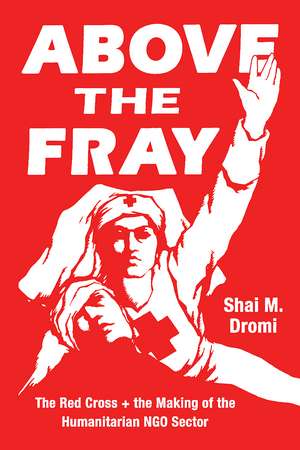Above the Fray: The Red Cross and the Making of the Humanitarian NGO Sector
Autor Shai M. Dromien Limba Engleză Paperback – 6 feb 2020
Drawing on archival research, Dromi traces the genesis of the Red Cross to a Calvinist movement working in mid-nineteenth-century Geneva. He shows how global humanitarian policies emerged from the Red Cross founding members’ faith that an international volunteer program not beholden to the state was the only ethical way to provide relief to victims of armed conflict. By illustrating how Calvinism shaped the humanitarian field, Dromi argues for the key role belief systems play in establishing social fields and institutions. Ultimately, Dromi shows the immeasurable social good that NGOs have achieved, but also points to their limitations and suggests that alternative models of humanitarian relief need to be considered.
Preț: 184.45 lei
Nou
Puncte Express: 277
Preț estimativ în valută:
35.30€ • 36.64$ • 29.43£
35.30€ • 36.64$ • 29.43£
Carte disponibilă
Livrare economică 01-15 martie
Livrare express 18-22 februarie pentru 23.07 lei
Preluare comenzi: 021 569.72.76
Specificații
ISBN-13: 9780226680248
ISBN-10: 022668024X
Pagini: 240
Ilustrații: 8 halftones
Dimensiuni: 152 x 229 x 18 mm
Greutate: 0.34 kg
Ediția:First Edition
Editura: University of Chicago Press
Colecția University of Chicago Press
ISBN-10: 022668024X
Pagini: 240
Ilustrații: 8 halftones
Dimensiuni: 152 x 229 x 18 mm
Greutate: 0.34 kg
Ediția:First Edition
Editura: University of Chicago Press
Colecția University of Chicago Press
Notă biografică
Shai M. Dromi is associate senior lecturer on sociology at Harvard University. He is the author of Above the Fray: The Red Cross and the Making of the Humanitarian NGO Sector and coeditor of The Handbook of the Sociology of Morality, vol. 2.
Cuprins
Preface
Introduction / The Humanitarian Space
ONE / Inter Arma Caritas: The Cultural Origins of Humanitarian NGOs
TWO / The Réveil and the Founding of the Red Cross
THREE / The Spread of Humanitarian Culture Across Borders
FOUR / The Spread of Humanitarian Logics into New Domains
FIVE / Sans- Frontiérisme and the Rise of “New Humanitarianism”
Conclusion / Reconsidering the Culture of the Humanitarian Field
Acknowledgments
Appendix: Sources and methodology
Notes
Bibliography
Index
Introduction / The Humanitarian Space
ONE / Inter Arma Caritas: The Cultural Origins of Humanitarian NGOs
TWO / The Réveil and the Founding of the Red Cross
THREE / The Spread of Humanitarian Culture Across Borders
FOUR / The Spread of Humanitarian Logics into New Domains
FIVE / Sans- Frontiérisme and the Rise of “New Humanitarianism”
Conclusion / Reconsidering the Culture of the Humanitarian Field
Acknowledgments
Appendix: Sources and methodology
Notes
Bibliography
Index
Recenzii
"To write this remarkably well-theorized, well-documented, well-written, succinct, and gripping book, Dromi creatively assembles a range of sources, making rich and thought-provoking arguments explaining how this“human-tarianfield” developed, how a certain kind of professionalism developed, and how secular universalism arose and spread across the globe. Of course, other processes contributed to these now-stable elements of our social world,but the processes Dromi describes will, from now on, be seen as essential."
“Above the Fray is a major effort to analyze the development of a distinct humanitarian field animated by the religious worldview of the nineteenth Calvinist milieu of Geneva, which connects a network of philanthropists, pacific activists, and religious actors concerned with addressing human tragedies. In telling the story of the emergence of this institutional field, Dromi innovates by bringing meaning-making into Bourdieusian field analysis in a non-reductivist fashion. Thus, he makes a brilliant contribution to historical sociology, and offers a much-needed addition to the sociological theory of fields. His book will be a crucial point of reference for several fields of research in the years to come.”
“Humanitarianism is not just an ethical orientation, but a whole sector of social institutions and practical actions. Dromi’s Above the Fray superbly illuminates both the history of this field since the founding of the Red Cross and its increasingly difficult challenges today.”
